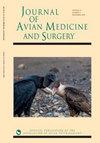What Is Your Diagnosis?
IF 0.6
4区 农林科学
Q3 VETERINARY SCIENCES
引用次数: 0
Abstract
A 7-year-old, intact female, little penguin (Eudyptula minor) was presented with a 3to 4month history of reluctance or inability to raise its right flipper after a presumptive traumatic event (Fig 1). The bird was a member of a little penguin colony housed in an outdoor enclosure at Sea World (Queensland, Australia). On examination by the referring veterinarian, the right flipper appeared diffusely swollen and painful. There was no evidence of an external wound. Radiographic images were acquired at that time (Figs 2A and B), and a complete blood count and plasma biochemistry analysis were performed (Table 1) on blood collected preprandially. The radiographic images showed no apparent skeletal abnormalities, although polyostotic hyperostosis, usually associated with hyperestrogenism, was present in the long bones of the limbs. Complete blood count and plasma biochemistry results showed no significant abnormalities, despite sample hemolysis. After the initial examination, the penguin was prescribed meloxicam (0.5 mg/kg PO q24h 3 8 weeks; Metacam Oral Suspension, Boehringer Ingelheim, North Ryde, New South Wales [NSW], Australia). After 12 weeks, the swelling affecting the right flipper was reduced but the bird still could not raise the limb. The bird was then referred to the University of Queensland Veterinary Teaching Hospital (Queensland, Australia) for further evaluation. On physical examination at the University of Queensland Veterinary Teaching Hospital, the bird weighed 1 kg and was considered to be in fair to你的诊断是什么?
本文章由计算机程序翻译,如有差异,请以英文原文为准。
求助全文
约1分钟内获得全文
求助全文
来源期刊
CiteScore
0.90
自引率
0.00%
发文量
52
审稿时长
>36 weeks
期刊介绍:
The Journal of Avian Medicine and Surgery is an international journal of the medicine and surgery of both captive and wild birds. Published materials include scientific articles, case reports, editorials, abstracts, new research, and book reviews.

 求助内容:
求助内容: 应助结果提醒方式:
应助结果提醒方式:


